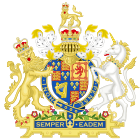Sophia Naturalization Act 1705
| Act of Parliament | |
 | |
| Long title | An Act for the Naturalization of the Most Excellent Princess Sophia, Electress and Duchess Dowager of Hanover, and the Issue of her Body |
|---|---|
| Citation | 4 & 5 Ann. c. 16 (Ruffhead: 4 Ann. c. 4) |
| Dates | |
| Royal assent | 21 December 1705 |
| Commencement | 25 October 1705 |
| Repealed | 1 January 1949 |
| Other legislation | |
| Repealed by | British Nationality Act 1948 |
| Relates to | |
Status: Repealed | |
The Act for the Naturalization of the Most Excellent Princess Sophia, Electress and Duchess Dowager of Hanover, and the Issue of her Body was an Act of the Parliament of England (4 & 5 Ann. c. 16) in 1705. It followed the Act of Settlement 1701, whereby Dowager Electress Sophia of Hanover and her Protestant descendants were declared to be in the line of succession to the throne (her son George I later became king).
Sophia, a granddaughter of James VI of Scotland and I of England, was not considered to be an Englishwoman as she had not been born in England. This Act naturalized her and "the issue of her body", provided they were not Catholic, as English subjects. Any person born to a descendant of Sophia could also claim to be the "issue of her body".
In 1947, Prince Frederick of Prussia succeeded in a claim under the Act, having renounced his German citizenship.
The Act was repealed by the British Nationality Act 1948.[1] However, any non-Catholic descendant of the Electress born before the repealing statute was enacted had already automatically acquired the status of a British subject, so there are still people alive who can claim British nationality under the Sophia Naturalization Act.
This was first tested between 1955 and 1957 when Prince Ernest Augustus of Hanover successfully claimed British nationality on this basis[2][3] after considerable litigation.[4] As he was born and was a Protestant while the Act was in force, the courts recognized that he had already acquired citizenship, which the repeal of the statute did not affect. Alexander, Crown Prince of Yugoslavia was also given British citizenship using the Sophia Naturalization Act.[5]
In the present time, however, most people likely to successfully claim citizenship in this manner would obtain the status of British Overseas citizen.[3]
See also
[edit]References
[edit]- ^ British Nationality Act 1948, 11 & 12 Geo. 6, c. 56, ss. 34 (3).
- ^ Attorney-General v HRH Prince Ernest Augustus of Hanover [1957] 1 All ER 49
- ^ a b Hanover (Electress Sophia of) (.pdf file) at gov.uk: Nationality instructions: volume 2
- ^ See the thorough discussion by A. Lyon at Statute Law Review 20:2 (1999) 174–84.
- ^ BBC News 18/07/2016
